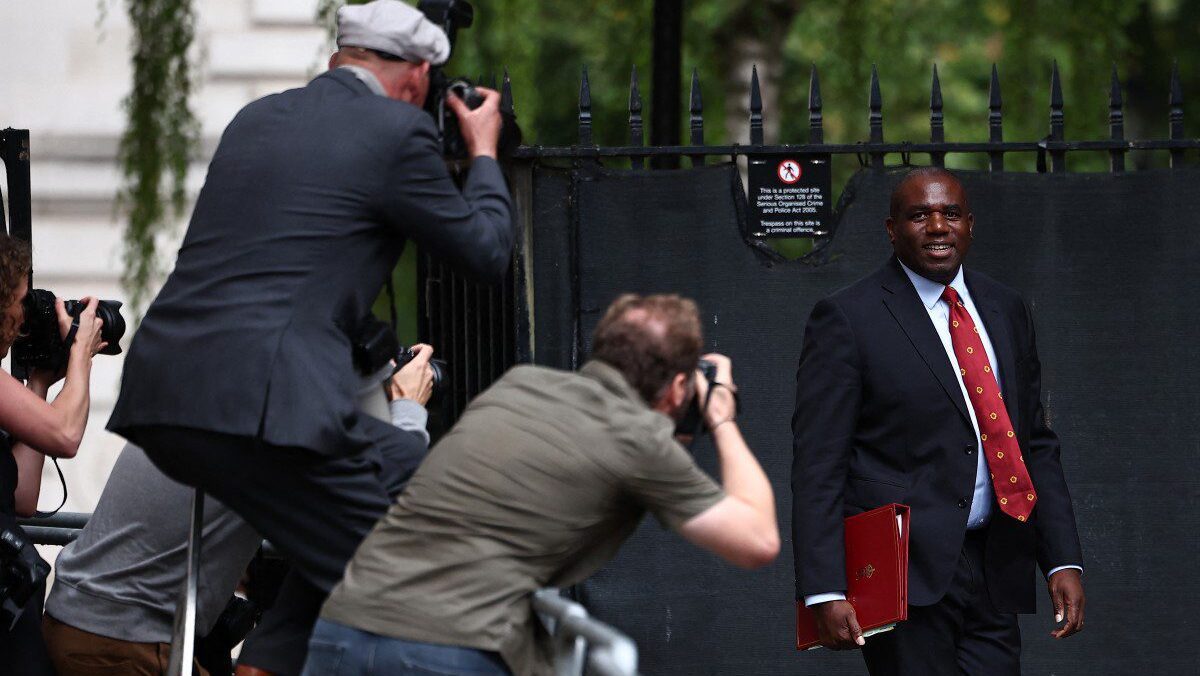
Britain’s Foreign Secretary David Lammy arrives to attend a Cabinet meeting at 10 Downing Street in London on September 3, 2024.
Photo: HENRY NICHOLLS / AFP
Labour Foreign Secretary David Lammy today announced that Britain will suspend selected arms exports to Israel.
The announcement provides further proof that Westminster is actively undermining the only democracy in the Middle East, even while it is fighting a war on multiple fronts against the Islamist terror groups of the so-called Axis of Resistance.
Officially, the decision is based on the government’s speculative conclusion—through a review it commissioned straight after the July general election—that there is a “clear risk certain military exports to Israel might be used in violations of International Humanitarian Law.” Politico notes, however, that “insufficient evidence was found to rule on further breaches” based on Israel’s post-October 7th counter-terrorism campaign.
Unofficially, the move is clearly intended to bring about unity within the Labour party—that is, by capitulating to its more leftist fringes, which have already complained that the suspension doesn’t go far enough.
Yesterday it was confirmed an Israeli F-35 fighter jet – made in part in Britain – was instrumental in a recent attack on a "safe zone" in Gaza, killing 90 people.
— Zarah Sultana MP (@zarahsultana) September 3, 2024
Hours later the UK government refused to suspend licences pertaining to F-35s.
ALL arms sales to Israel must end.
It “seems,” one U.S. think tanker told The New York Times, that prime minister Sir Keir “Starmer was looking to make a point to maintain coherence within the party without trying to make too big of a difference.”
Thirty licenses—including parts for fighter planes, helicopters and drones—have been put on immediate hold. More than 300 licenses will remain in place—for now.
The most important aspect of this suspension is not, however, the withholding of arms themselves, but the message this sends about support—or withdrawing support—for Israel at a time when it needs it most.
UK Chief Rabbi Sir Ephraim Mirvis added that the suspension “beggars belief.”
As Israel faces down the threat of Iran and its proxies, not just to its own people, but to all of us in the democratic west; this announcement feeds the falsehood that Israel is in breach of International Humanitarian Law, when in fact it is going to extraordinary lengths to uphold it.
It beggars belief that the British government, a close strategic ally of Israel, has announced a partial suspension of arms licences, at a time when Israel is fighting a war for its very survival on seven fronts forced upon it on the 7th October, and at the very moment when six…
— Chief Rabbi Sir Ephraim Mirvis (@chiefrabbi) September 2, 2024
Hamas appeared to suggest earlier this week that the six Israeli hostages found dead in a Gaza tunnel—prompting the threat of a general strike in Tel Aviv—were deliberately executed because they were about to be rescued.
“Now,” said British political academic Matthew Goodwin, “is not the time to turn the screws on Israel, with hostages still in the tunnels and Iran … feeling emboldened. Keir Starmer has put Labour sectarian interests ahead of our national interest and our core allies.”
This Labour government is amateur hour. Now is not the time to turn the screws on Israel, with hostages still in the tunnels and Iran et al. feeling emboldened. Keir Starmer has put Labour sectarian interests ahead of our national interest and our core allies.
— Matt Goodwin (@GoodwinMJ) September 3, 2024
Talking of Labour sectarian interests, the move coincides with the establishment of a new Independent Alliance grouping in the UK parliament, comprising five ‘pro-Palestine’ MPs elected in July 2024 and now headed by Starmer’s predecessor Jeremy Corbyn. By reaching out to suspended Labour MPs, the Alliance aims to increase pressure on government policy.
The policy shift comes just months after Lammy restarted funding to a United Nations agency—the Relief and Works Agency for Palestine Refugees in the Near East (UNRWA)—that Israel claims has been infiltrated by Hamas.
While sycophantic state media the BBC hails the “subtlety and nuance in each of these decisions,” its news webpage separately splashed on Benjamin Netanyahu calling the move “shameful”.
It is no wonder then that Israeli Foreign Minister Israel Katz has lamented a “series of recent decisions” since Starmer came to office. Katz is unlikely to be impressed by whatever will come next.
